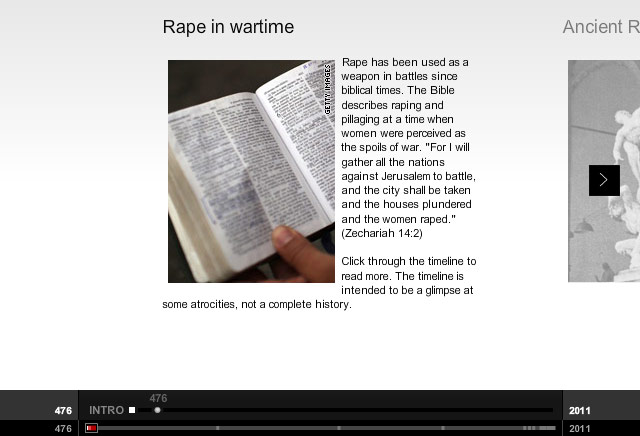-------------------------------------------------------
Editor's Note: This is the first of two stories focusing on rape as a tool of war. The second story, being published tomorrow, looks at the untold stories of rape in the Holocaust. Both stories contain graphic language; discretion is advised.
(CNN) -- It began as a headache. Then her throat started to feel tight. A dull pain welled in her chest and her joints ached.But Victoria Sanford continued to do the interviews. Even in the middle of the night, the women in Guatemala always managed to find her, the "gringa" they heard had come to listen to them.
It was the early 1990s, years before the international community would formally recognize the Guatemalan government's role in the systematic rape of its Mayan women -- and decades before the current violence in Libya and elsewhere around the Middle East would once again remind the world of the brutal effectiveness of rape as a weapon of war.
Libyan rebels say captured cell phone videos show rape, torture
Sanford was then in her early 30s and pursuing an anthropology doctorate at Stanford University. A Spanish speaker who had worked with Central American refugees, she befriended the few Mayans who had moved to California.
"I was moved by their stories, but even more so because they were intent on someone hearing them," she said. "And no one was listening."
So Sanford joined the nonprofit Guatemalan Forensic Anthropology investigative team and went to Guatemala. The team's job was to exhume mass graves, but Sanford talked to the women, who told other women about her, and soon she was recording their stories.
 Timeline: Rape in wartime
Timeline: Rape in wartime But they also do it for a simpler reason: They believe that listening is acknowledgement -- and that acknowledgment is a kind of apology. Listening, they say, is the least the world owes.
CBS reporter Lara Logan: I feared a 'torturous death' in Egypt
So they sit patiently and listen to the victims: The little girl who was raped in a Darfur refugee camp and made an amputee when her assailants tried to kill her by hacking off her arms and legs. The man in the Democratic Republic of Congo who told how a female general of a warring tribe turned him into a sex slave, and how the baby born of that assault is being kept from him as further manipulation. The Kosovo woman who can't help her spontaneous screams of rage while she tells how soldiers climbed on top of her, choked and beat her and did things too graphic to publish here.
'They killed our babies'
In Guatemala, Sanford listened as the Mayan women -- disheveled, filthy, bruised and malnourished, their eyes dull and dead -- told how they hiked through the freezing mountains, fleeing guerrillas who were using their villages as hiding places from government soldiers who wanted the guerrillas dead:
The soldiers set fire to our villages. They shot our husbands and brothers, burned our houses. They stopped to wait for the sound of our babies crying. When they cried, the soldiers came toward the wailing.
They killed our babies. They raped us.


No comments:
Post a Comment